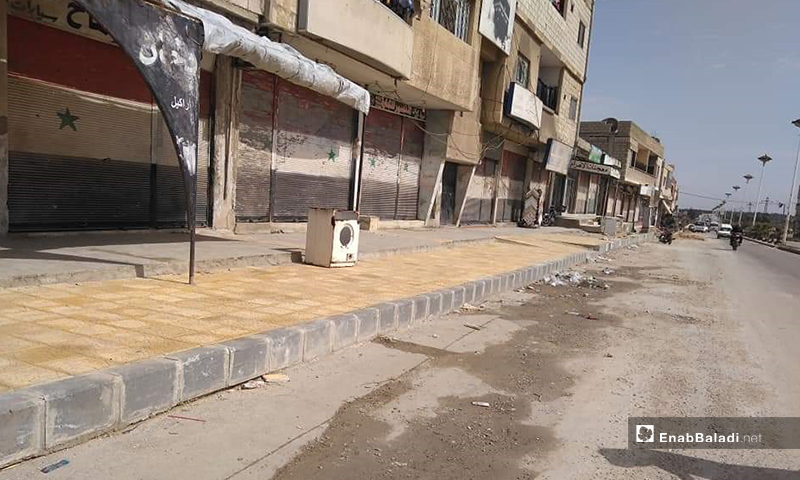Enab Baladi – al-Qunaytirah
Since the tightening of precautionary measures imposed by the Syrian regime in its controlled-areas to prevent the spread of the novel coronavirus (COVID-19) pandemic, citizens have found ways to get around the partial curfew decision issued by the regime’s government.
The decision includes a partial daily curfew from 6 p.m. to 6 a.m from Monday till Friday, and on Saturday and Sunday from 12 p.m. to 6 a.m., as well as the complete closure of all shops aside from food selling ones outside the curfew period.
The regime’s government announced that violators of the curfew decision would receive a punishment that ranges from six months to three years of imprisonment, along with a fine between 50 and 500,000 Syrian Pounds (SYP = 0.038 to 380 USD).
According to the prevention order, police patrols should prepare an arrest report against violators, then transfer them to the public prosecution, for the latter to refer them before the court of first instance.
Enab Baladi interviewed one of the violators caught by the police in al-Qunaytirah province, who spoke on the condition of anonymity for security reasons.
This man, who works as a vendor, decided to open his shop two weeks after the closure order, despite the curfew decision, which he justified by saying that four families make their living from working in this place.
The vendor told Enab Baladi that after few hours from opening the shop, a police patrol came and cordoned off his place. Then they took him to prison under the accusation of breaking the curfew laws; therefore, he was imprisoned for four days, to be released later after paying a fine of 50,000 SYP (38 USD).
Permitted violations
According to Omar al-Sayyed, a resident of Khan Arnabah town, the commercial center of al-Qunaytirah province, police patrols turn a blind eye to some shop owners and allow them to open their stores during the curfew.
Al-Sayyed confirmed through his close observations of what is happening on the ground that the police patrols roaming the streets of the city supposedly to apply the curfew decisions and close the shops, allow those bribing them to open their shops.
These patrols are also overlooking loyalists to the Syrian regime or members of the people’s committees, according to al-Sayyed.
However, they prevent those linked with the opposition from opening their places, regardless of their connection, whether they are from a village known for its support to the opposition, a relative, or a friend of an opponent to the Syrian regime.
A decision hard to implement
Enab Baladi monitored the closure of most shops in the city center of the province and its countryside, except those selling food items, vegetables, and fruits, in adherence to the governmental decisions.
The movement also appears to be reduced in the main streets in the al-Qunaytirah city, amid residents’ expectation that the government’s officials will undertake accelerated measures to resolve their struggle to make a living.
Mohammed al-Ahmed, from the southern countryside of al-Qunaytirah province, told Enab Baladi that hunger is lurking around the city residents and that it is far more dangerous than the coronavirus, referring to the deteriorating economic situation in the province and the need to revitalize the commercial movement.
All in all, citizens met by Enab Baladi agree that the partial curfew announcement is adversely affecting daily wage workers, especially amid the massive price hike, which justifies why some people are trying to open their shops by bypassing government decisions.
According to what Enab Baladi monitored in a previous report, the spread of the coronavirus and the subsequent closure decision of the Nassib border crossing, as a preventive measure to curb the transmission of the virus, led to a new rise in commodity prices in southern Syria.
This price hike was caused by a shortage of foodstuffs which used to arrive from Jordan through the crossing, such as oil, rice, and some raw materials, as well as clothing and shoes.

